Blog Post
Posted by Dion Todd May 30th, 2020 4,184 Views 0 Comments
Bible Study, The Gospel of John, Chapter One from Refreshing Hope Ministries on Vimeo.
Today we are going to study the good news of John chapter 1 in depth. You can follow along in your own Bible if you like. I will be reading from the World English Bible because it is the only modern English translation that is copyright free, and I can read the entire Bible on video and put it on our website without paying someone money, without any legal drama, or breaking anyone’s rules. After you finish this study, please take the accompanying quiz to test your knowledge. Thanks to everyone that has participated so far.
Introduction: Let’s begin with some basic information about the book:
* Who wrote the Gospel of John? All sources point to the Apostle John who Jesus found on the beach fishing with his brother James, the sons of Zebedee (Matthew 4:21). Jesus later called them “the sons of thunder” because they wanted to call down fire from heaven on a village that rejected them (Mark 3:17).
There are hints throughout the book that it was written by an eyewitness. The writer describes places, smells, and the time of day. For instance, in John 8:20 he tells us that Jesus was teaching “in the temple treasury.” In 12:3 when the woman broke the jar of perfume, the house was filled with its fragrance. The loaves of bread that Jesus fed the multitude with in 6:9 were barley loaves. The branches the people greeted Jesus with in 12:3 were Palm branches. It was night when Judas left the upper room in 13:30. The book was written as if someone were writing the events directly from their memory.
* When was the Gospel of John written? He probably wrote it from Ephesus between 85–90 A.D. after the destruction of Jerusalem in A.D. 70, but before his exile to the island of Patmos.
* Why are there four gospels? The ancient Christian writer Origen (A.D. 185–254) gave a good answer: “There are not four gospels, but one fourfold gospel.” Each gospel presents a different perspective on the life of Jesus, and we need all four to get the full picture. Matthew emphasizes the kingship of Jesus, Mark His servanthood, Luke His manhood, and John His Godhood. John uniquely presents Jesus as the great Creator-God of the universe.
* How is John different than the other Gospels? Over 90 percent of John is unique to his Gospel. John does not contain a genealogy or any record of Jesus’ birth, His childhood, the temptation, transfiguration, appointment of the disciples, nor any account of Jesus’ parables, ascension, or the great commission. John records eight miracles and six are unique (among the Gospels) to John, as well as the “Upper Room Discourse” (chapters 14–17).
John was with Jesus from the beginning of His ministry to the end. He was quite possibly there the day Jesus was baptized in the Jordan River. He was one of the inner three Apostles who Jesus took with Him to special places, like the Mount of Transfiguration (Matthew 17:1), the garden of Gethsemane (Matthew 26:37), and the resurrection of Jairus’ daughter (Luke 8:51). John was there through it all, and when Jesus was crucified, John was the only disciple at the foot of the cross (John 19:25).
Some notes about the author: John was born about A.D. 6 in Galilee. He was three years younger than his brother James, and about ten years younger than Jesus, who was believed to have been born about 4 B.C. John is usually listed as the youngest Apostle of Jesus and the only one to die of natural causes, for all the others were martyred. In Hebrew John means: “God Favored.” His father was named Zebedee, and according to Church tradition his mother was Salome. Zebedee, James, and John were a family of fishermen who worked the Sea of Galilee (Luke 5:1–10).
John was originally a disciple of John the Baptist along with Andrew (John 1:35). He wrote the Gospel of John anonymously, and he referred to himself in the book simply as “the disciple whom Jesus loved” (John 21:20). In total, John wrote five books: The Gospel of John, the 3 letters of John, and Revelation. It is believed that he died of natural causes between 98 and 101 A.D. In city of Ephesus. Let’s get started:
John Chapter 1 beginning in verse 1, reading from the World English Bible: In the beginning was the Word, and the Word was with God, and the Word was God. 2 The same was in the beginning with God.
This opening verse is a brilliantly inspired statement from the Holy Spirit that encompasses and defines the rest of the book. This is a one liner straight from the throne room of God. John 1:1 sets forth one of the most basic foundations of our faith, the Father, the Son, and the Holy Spirit - we call it the Trinity. From this verse we learn:
* The Word is a pre-existent eternal being who was here from the BEGINNING, and not created later. There was never a time when they did not exist.
* The Word is not the same Person as God, for they are WITH God.
* Both the Word and God, are equally God, for the Word WAS God.
* The Word refers to Jesus of Nazareth, the Christ, the Anointed One, the Messiah, the Man that John wrote about in this book.
The Father is not the Son, and the Son is not the Father. Yet they are equally God, with God the Holy Spirit making one God in three Persons. I know that is a lot to get your head around, but hopefully it will become clearer as we progress through the book.
3 All things were made through him. Without him, nothing was made that has been made.
In short: Jesus created the universe. Wow that is a big statement, but scripture from beginning to end confirms it.
(Genesis 1:1 NKJV) In the beginning God (elo-him) created the heavens and the earth.
“Elo-him” is the plural form of God, yet singular in meaning. Here the Father, the Son, the Holy Spirit, worked together in unity with one purpose.
(Colossians 1:15–16 NKJV) He is the image of the invisible God, the firstborn over all creation. For by Him all things were created that are in heaven and that are on earth, visible and invisible, whether thrones or dominions or principalities or powers. All things were created through Him and for Him.
(Hebrews 1:1–2 NASB) God, after He spoke long ago to the fathers in the prophets in many portions and in many ways, in these last days has spoken to us in His Son, whom He appointed heir of all things, through whom also He made the world.
Jesus, the Creator of the universe.
4 In him was life, and the life was the light of men.
The ancient Greek word translated as life is zoe, which means “the life source,” not bios, which is mere biological life. This speaks of spiritual light as well as natural light. It isn’t that the Word “contains” life and light; He is life and light. Life source is defined as:
life source n. — the inherent capacity for producing (and maintaining) living beings; especially understood as a life characterized by healthiness, happiness, exuberance, energy, vitality, and the like.
Jesus brings all of these things to your life in fullness. The more of Him you have, the more of these you will have. Without Jesus, we are dead and in darkness. We are lost.
5 The light shines in the darkness, and the darkness hasn’t overcome it.
Darkness can never overcome the light. Darkness is the absence of light. When the light appears, darkness flees like turning on a light switch in a dark room. When Jesus appeared, demons trembled and cried out in terror, none stood a chance.
6 There came a man sent from God, whose name was John.
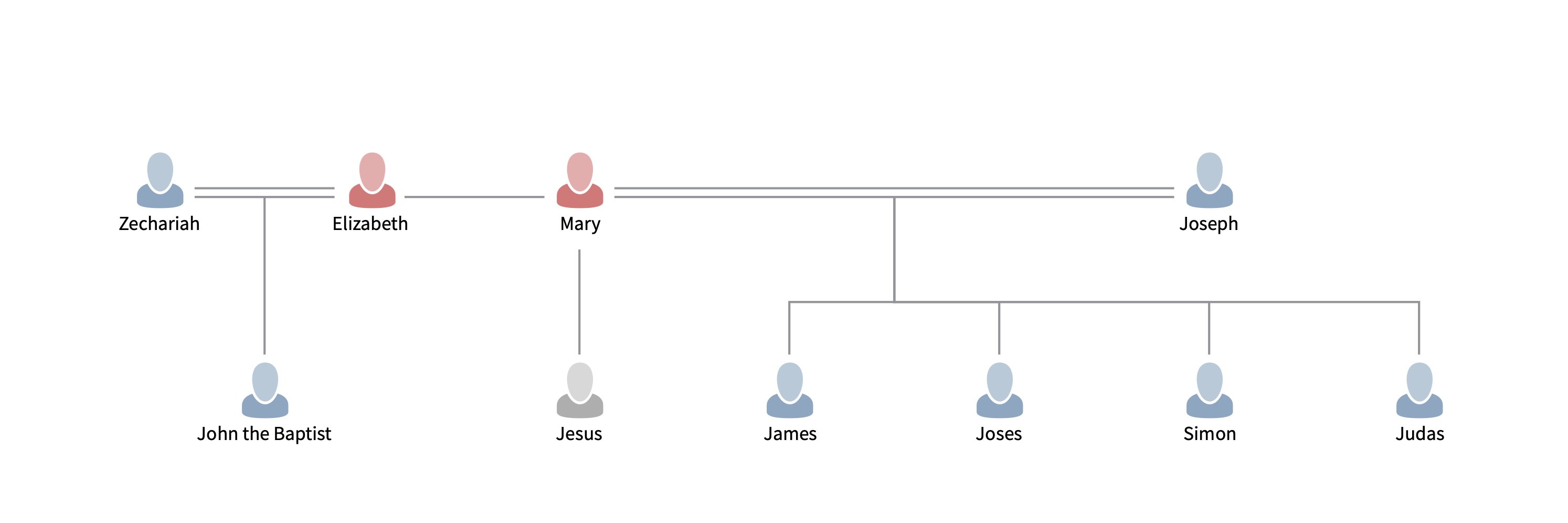
John carried the spirit of Elijah and he even dressed like him wearing a coat of camel’s hair and with a leather belt (2 Kings 1:8). According to Luke 16:16, John was the last of the Old Testament Prophet era. He lived in the wilderness and preached that people should repent, that he was preparing the way for the Lord.
John was called “The Baptist” because he baptized people in the river as a sign of repentance, a spiritual washing to prepare them for the coming of the Messiah. He had nothing to do with forming the Baptist denomination, which was started by John Smyth 1600 years later in Amsterdam.
7 The same came as a witness, that he might testify about the light, that all might believe through him. 8 He was not the light, but was sent that he might testify about the light. 9 The true light that enlightens everyone was coming into the world.
The light refers to Jesus. John came as a forerunner to tell everyone that the Messiah, the Chosen One, the Christ was soon coming.
10 He was in the world, and the world was made through him, and the world didn’t recognize him. 11 He came to his own, and those who were his own didn’t receive him.
Though Jesus created world, when He appeared as a man, the world did not recognize Him. This is a bit scary and I often wonder if we could do the same. The people could not believe that God would appear as an humble Servant, yet He does this time and time again through out history. Jesus came to the Earth born in a crude stable and lay in a livestock feeding trough. The King of all Kings, yet the lowest of the low. All through His life, He never exalted Himself. Though He had oh so much power, He chose to be an humble Servant. When He came to His people, they said “Can anything good come from Nazareth?”
12 But as many as received him, to them he gave the right to become God’s children, to those who believe in his name: 13 who were born, not of blood, nor of the will of the flesh, nor of the will of man, but of God.
Not everyone rejected Jesus. They were all given a choice as we are today, and those who chose to believe in Him were given the right to become the children of God. Being God’s “children” means we can call God Father. We can call him “Abba, Father” or “dearest Father.” We can call God, if we do not say it flippantly, Daddy. Calling Almighty God Daddy is a precious privilege, but we are now a part of His family. And before Jesus came, it just was not possible.
John makes it clear the way to become a child of God is through believing in Jesus. It has nothing to do with who we were born as. Even if you could trace your genealogy back to James, the brother of our Lord, then through St. Augustine, to Martin Luther, then up to John Wesley and Charles Spurgeon, you still would not be saved, unless you believed in Jesus.
God has made it simple. Verse 12 has two key phrases: “Yet to all who received him” and “to those who believed in his name.” All we have to do is believe. Once we ask Christ into our life, we can cry in our heart, “Abba, Father, I have come home.”
14 The Word became flesh and lived among us. We saw his glory, such glory as of the only born Son of the Father, full of grace and truth.
John was saying that in Jesus as the Word, God’s “shekinah” glory had become incarnate. The Jews had a hard time accepting that the great God revealed in the Old Testament could take on human form. John says to the Jewish thinkers, “the Word of God became flesh and lived among us.”
15 John testified about him. He cried out, saying, “This was he of whom I said, ‘He who comes after me has surpassed me, for he was before me.’ ”
Jesus was here at the beginning in Genesis 1:1 during the creation of the universe, so he was much older than John, though physically six months younger.
16 From his fullness we all received grace upon grace. 17 For the law was given through Moses. Grace and truth were realized through Jesus Christ.
Jesus carried an immeasurable, inexhaustible supply of grace and truth, which starkly contrasted the rigid laws and regulations of the Pharisees.
18 No one has seen God at any time. The only born Son, who is in the bosom of the Father, has declared him.
John begins again with the experience of Moses in Exodus 33:18–23. When Moses asked to see God’s glory, he was told to stand in the cleft of a rock as God passed by so that God could cover his face lest he look upon God’s face and die. John’s statement, “no one has ever seen God,” does not mean people have never seen visions of God because that has occurred in Exodus 24:9–11; Isaiah 6:1–13; Ezekiel 1–3. Those visions were partial, however, and no one has ever seen God as he truly is.
It could be that the human body could not actually withstand seeing God face to face and it would be instant death. Consider how long you would last if you suddenly appeared on the surface of the sun. The glory of God could be that intense. After Jesus left the tomb, a squadron of hardened Roman soldiers were still guarding it, when an angel descended from heaven, rolled the stone back and sat on it. The soldiers fell to the ground like “dead men.” They were slain in the spirit. That was a single angel who’s presence could not even be compared with God Almighty.
Jesus is fully God and yet a different person than the Father. This is an expansion of verse 1, “The Word was with God.” They had the deepest relationship imaginable. As a result, the Word “has revealed God to us,” is the heart of the message. No one knows the Father better than Jesus, and He shares what He knows with us.
19 This is John’s testimony, when the Jews sent priests and Levites from Jerusalem to ask him, “Who are you?” 20 He declared, and didn’t deny, but he declared, “I am not the Christ.”
John made it clear that he was not the coming Messiah, his job was to point to the real Messiah who was standing among them.
21 They asked him, “What then? Are you Elijah?” He said, “I am not.” “Are you the prophet?” He answered, “No.”
According to Malachi 4:5–6, the prophet Elijah who had been taken to heaven, would return before the Chosen One came. So they thought if he is not the Christ, then maybe he is Elijah. John said “No.” He was not physically Elijah, but according to Matthew 11:14 and Mark 9:13, he carried his office and spirit.
22 They said therefore to him, “Who are you? Give us an answer to take back to those who sent us. What do you say about yourself?” 23 He said, “I am the voice of one crying in the wilderness, ‘Make straight the way of the Lord,’ as Isaiah the prophet said.”
John sees himself as the advance man of the great King. His baptism was a cleansing to prepare the people for the visit of the King. The idea behind this is, “get cleaned up, the King is coming, get ready for a royal visit!”
24 The ones who had been sent were from the Pharisees. 25 They asked him, “Why then do you baptize if you are not the Christ, nor Elijah, nor the prophet?”
Jews practiced baptism then, it had grown out of their ceremonial washings, but baptism was reserved for Gentiles who wanted to become Jews. For example, Jews then washed the arms up to the elbows before a meal and were considered clean. When a Gentile converted to Judaism, they completely submerged them in water, the line of thought being they were much dirtier. John called them all dirty. He submerged them all in the river equally. For the Jews, it required them to stoop down to the Gentiles level, to humble themselves.
Therefore the people, the sinners, the outcasts, the tax collectors flocked to John and were baptized, but the educated scribes and Pharisees rejected him for they would not concede they needed to be baptized at all.
(Luke 7:29-30) When all the people and the tax collectors heard this, they declared God to be just, having been baptized with John’s baptism. 30 But the Pharisees and the lawyers rejected the counsel of God, not being baptized by him themselves.
As always, God chose the humble one in the wilderness instead of the established religious structure to reveal Himself through, and this burned the Pharisees even more. They considered themselves the religious elite and felt they could learn nothing from this wild man in the wilderness who wore clothes made of camel’s hair, and washed unclean people in the river. They felt that he wasn’t one of them, so there is no way that God could be working through him, but He was.
This same type of thing has happened time after time throughout the history of the church. God appears in the wilderness, a movement starts, the fire grows, it recovers some truths, but soon it becomes an establishment with a fixed set of rules, allowing nothing new. A revelation, a revival, a movement, a monument.
God has been working since the dark ages to restore the church to its former glory and power. Each truth He restores seems to start a new denomination, that will only believe so far. Once they have become “established”, He has to find another group. One group believes in water baptism, but not spirit baptism. The next group believes in Spirit baptism, but not tongues. The next group believes in tongues, but not prophecy. The next group believes in prophecy, but not… and the list continues to grow through the centuries. “Give Me That Old Time Religion” maybe a fun song, but unless you take it all the way back to the book of Acts, it is not what God wants to see.
26 John answered them, “I baptize in water, but among you stands one whom you don’t know. 27 He is the one who comes after me, who is preferred before me, whose sandal strap I’m not worthy to loosen.”
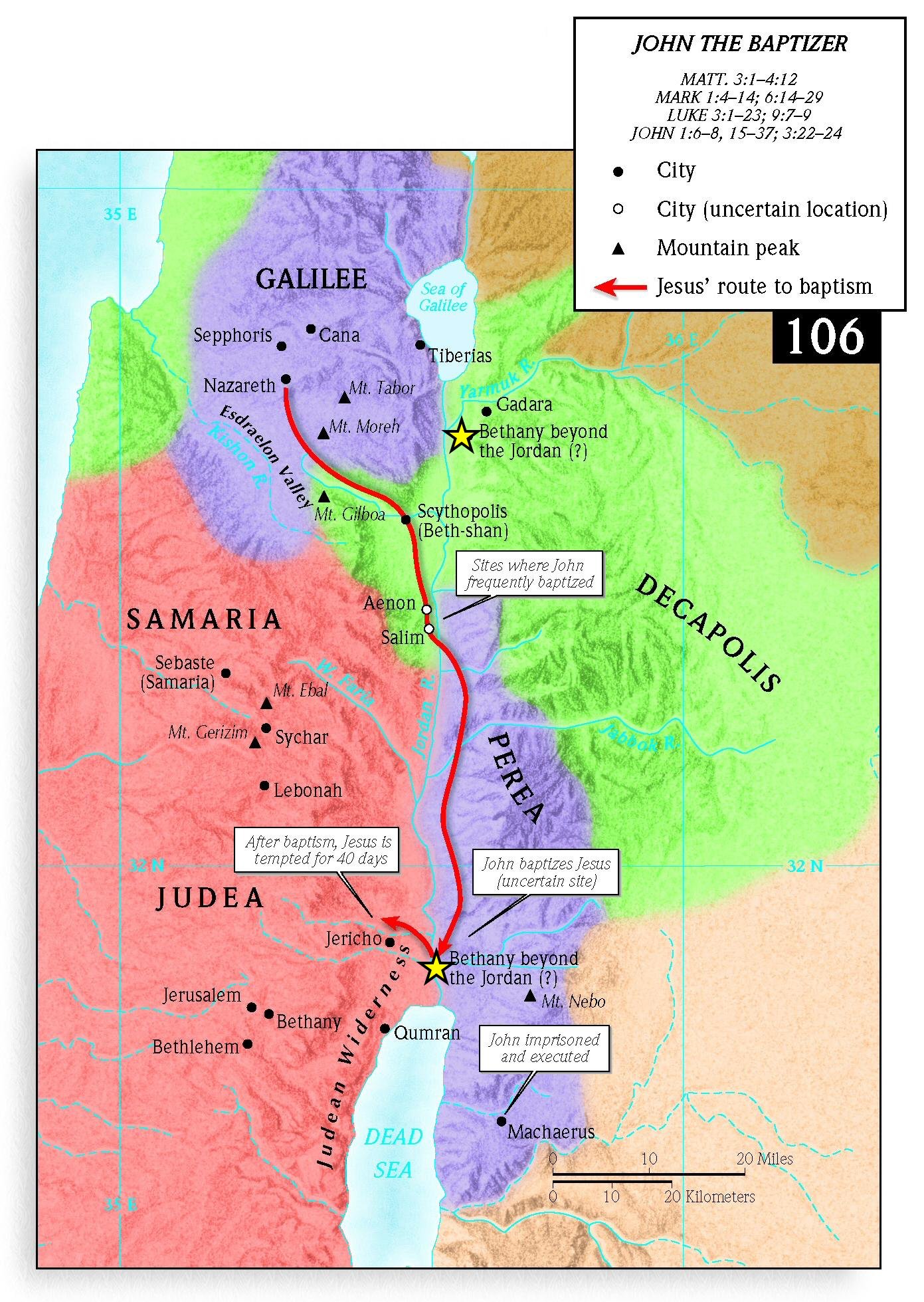
“Bethany beyond the Jordan” is an unknown location but it is thought to have been near the Sea of Galilee, or by the Dead Sea.
John was simply amazing. He always turned the topic towards Jesus Christ and away from himself. He said “I am the voice” not “I am the Word.” John was an humble man, but what a man. Jesus said that John was the greatest born of women (Matthew 11:11). He was even greater than Moses and Abraham.
John was a Nazirite from the time he was born, which means that he never cut his hair, never touched a dead body, and never drank wine. He lived a pure life and was filled with the Holy Spirit from birth. His mother had been a Nazirite before him, and his father a Levite priest. If there was ever anyone tempted to exalt themselves when they saw Jesus rising in popularity, while he lived a life of self-denial in the wilderness, it was John. Yet he always pointed them to Jesus and said later, “He must become greater. I must become less” (John 3:30).
29 The next day, he saw Jesus coming to him, and said, “Behold, the Lamb of God, who takes away the sin of the world!
This is the essence of the Gospel in a single sentence, the Lamb of God who takes away the sin of the world. The listeners had to remember the passover lamb. The night the destroyer, the Angel of Death, visited Egypt in Exodus 12:23, the Israelites were instructed to kill a lamb and put its blood on the door posts of their house. When the angel saw the blood, he would pass over that house. Only the ones who applied the blood to their house were spared.
John connected Jesus to that passover lamb, because it is the blood that Jesus shed for us on the cross that takes away our sin. Without the shedding of blood, there is no forgiveness (Hebrews 9:22). John’s statement made it clear that Jesus would be a sacrifice for sin. The blood of Jesus Christ cleanses us of all sin. Yes, Jesus came to give abundant life. Yes He worked miracles, and He will still work miracles in our lives today, but those things are benefits of the gospel. The gospel, the good news, is that Jesus Christ came to bear our sin on the cross. Through Him, we have complete forgiveness. He is the Lamb of God who takes away the sin of the world.
30 This is he of whom I said, ‘After me comes a man who is preferred before me, for he was before me.’ 31 I didn’t know him, but for this reason I came baptizing in water, that he would be revealed to Israel.” 32 John testified, saying, “I have seen the Spirit descending like a dove out of heaven, and it remained on him. 33 I didn’t recognize him, but he who sent me to baptize in water said to me, ‘On whomever you will see the Spirit descending and remaining on him is he who baptizes in the Holy Spirit.’ 34 I have seen and have testified that this is the Son of God.”
God had given John a sign to watch for, so that he could recognize the Son of God. John had baptized a lot of people, but when he baptized Jesus, the Holy Spirit descended from heaven like a dove, settled on Jesus, and remained on Him. Matthew 3:17 adds that a voice came out of heaven saying “This is My beloved Son in whom I am well pleased.” John identified Jesus and said “This is the Son of God.”
35 Again, the next day, John was standing with two of his disciples, 36 and he looked at Jesus as he walked, and said, “Behold, the Lamb of God!” 37 The two disciples heard him speak, and they followed Jesus.
Two of John’s disciples began to follow Jesus that day. According to verse 40 one was Andrew, Simon Peter’s brother. The second disciple is unnamed and may be John himself, who wrote this gospel and never named himself in it, but recorded exact hours and details like an eyewitness account. In verse 39, John wrote “It was about the tenth hour.” Another possibility is Philip, who appeared together with Andrew at other times. Jesus called Andrew and Philip; Andrew brought his brother Simon to Jesus, and Philip brought Nathanael.
38 Jesus turned and saw them following, and said to them, “What are you looking for?” They said to him, “Rabbi” (which is to say, being interpreted, Teacher), “where are you staying?” 39 He said to them, “Come and see.” They came and saw where he was staying, and they stayed with him that day. It was about the tenth hour.
The two disciples followed Jesus from a distance and He stopped and spoke to them. They asked Him where He was staying, and it is interesting to note that Jesus was not homeless. In fact He invited them back to His place, and they spent the rest of that day with Him. It gives us no details on what His place was like, but He grew up as a carpenter with his dad Joseph, so I can picture wherever He stayed being well maintained.
The time: The Romans counted the hours of the day from midnight on, so the tenth hour would have been 10 AM. The Jewish people counted the hours from 6 AM at dawn, and John was most likely using the Jewish time system here, so “the tenth hour” would be four in the afternoon.
40 One of the two who heard John and followed him was Andrew, Simon Peter’s brother. 41 He first found his own brother, Simon, and said to him, “We have found the Messiah!” (which is, being interpreted, Christ). 42 He brought him to Jesus. Jesus looked at him and said, “You are Simon the son of Jonah. You shall be called Cephas” (which is by interpretation, Peter).
Andrew went and found his brother Simon and told him “We have found the Messiah!” The Messiah, or Christ, refers to the “Anointed One” in the Old Testament, a great Jewish deliverer or king descended from King David (Deuteronomy 18:15, Ezekiel 37:24, many others).
Jesus avoided the title of Messiah because the Jews expected a military leader who would lead them in defeating Israel’s enemies, which at the time was the Roman empire, who had conquered them and was making them pay huge taxes. Every so often a leader like this would rise up and start a liberation army to fight against the Romans, and the rebellion would be put down (Acts 5:36). Jesus wanted to avoid being labeled as a rebel leader.
Jesus renamed Simon (hearing) to Peter (rock). Cephas is the Aramaic word for rock, identical to the Greek name of Peter.
43 On the next day, he was determined to go out into Galilee, and he found Philip. Jesus said to him, “Follow me.” 44 Now Philip was from Bethsaida, the city of Andrew and Peter.
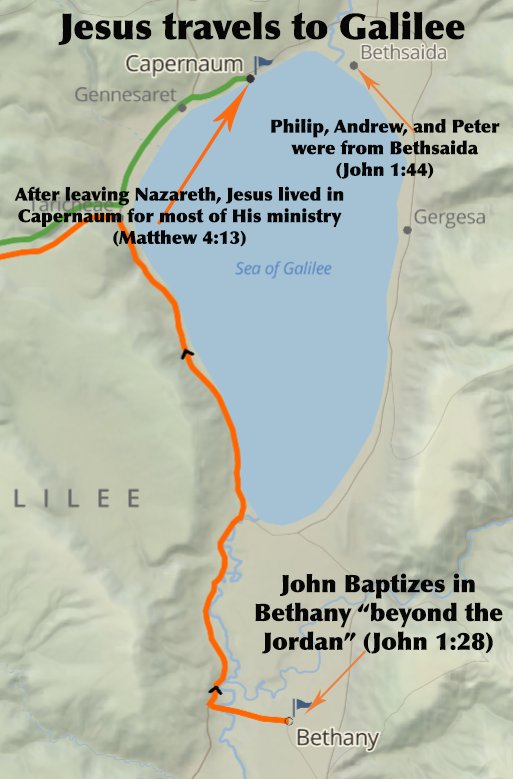
45 Philip found Nathanael, and said to him, “We have found him of whom Moses in the law and also the prophets, wrote: Jesus of Nazareth, the son of Joseph.” 46 Nathanael said to him, “Can any good thing come out of Nazareth?” Philip said to him, “Come and see.”
Philip was so excited that He found his friend Nathanael, and told Him about Jesus. It was certainly the Holy Spirit that prompted Philip to seek Nathanael out, for at the same time, Jesus was having a vision of Nathanael under the fig tree.
Nathanael knew that it was written that the Messiah was to be born in Bethlehem, not Nazareth. Jesus was actually born in Bethlehem while His parents were visiting there, then He grew up in Nazareth.
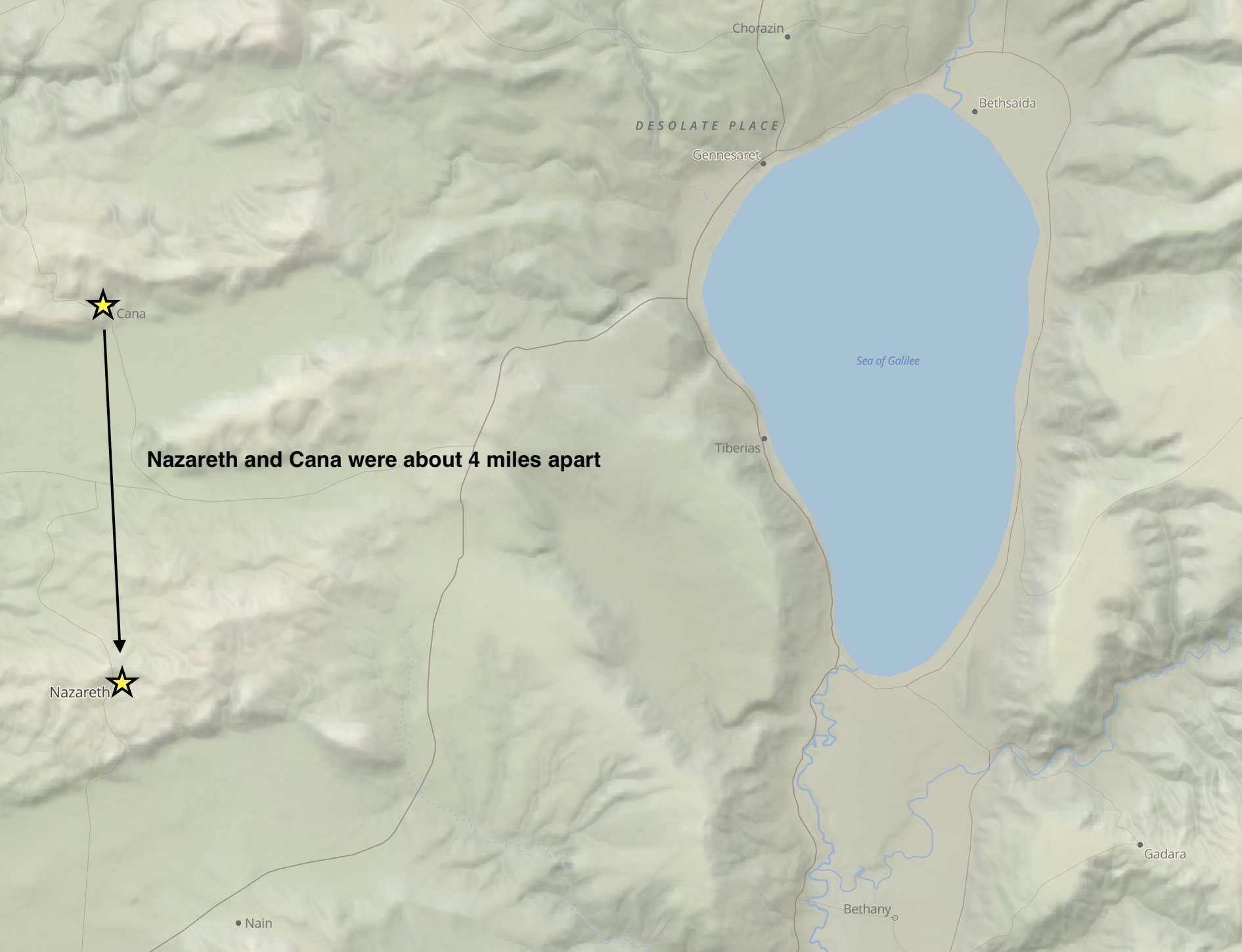
47 Jesus saw Nathanael coming to him, and said about him, “Behold, an Israelite indeed, in whom is no deceit!” 48 Nathanael said to him, “How do you know me?” Jesus answered him, “Before Philip called you, when you were under the fig tree, I saw you.”
The patriarch Jacob was full of deceit. It was his defining characteristic. The name Jacob means guile, deceiver, cheat, twister, con artist, crook. Then after wrestling with God one night, he was a changed man and he was renamed Israel. Jesus basically said that Nathanael was an ideal Israelite because all guile had gone out of his life, an Israelite in whom there was no Jacob.
Why a fig tree? “Under the fig tree” was a phrase Rabbis used then to describe meditation on the Scriptures. It is possible that Nathanael liked to pray and meditate on the things of the Lord under the shade of an actual fig tree. While he there spending time with the Lord, meditating on the Scriptures, Jesus tells him “I saw you.” The point is, Nathanael had had a spiritual experience under a fig tree and Jesus was saying, “I know about the experience you had under the fig tree with God.” Jesus knew!
Scholars believe that Nathanael, who was born in Cana, and Bartholomew in Matthew 10:3, were the same person. This is based on the fact that Bartholomew and Nathanael are usually mentioned in the same phrase as Philip, but the two names never appear together.
49 Nathanael answered him, “Rabbi, you are the Son of God! You are King of Israel!” 50 Jesus answered him, “Because I told you, ‘I saw you underneath the fig tree,’ do you believe? You will see greater things than these!” 51 He said to him, “Most certainly, I tell you all, hereafter you will see heaven opened, and the angels of God ascending and descending on the Son of Man.”
The reference to the fig tree was extremely meaningful to Nathanael, enough for him to change his entire view of Jesus and call Him the Son of God. “Angels ascending and descending on the Son of Man” connects Jesus with Jacob’s ladder in Genesis 28:12. Jacob saw in a dream that there was a ladder connecting heaven and Earth, and angels ascending and descending on it. Jesus is the ladder, the link, that connects heaven and Earth. It is quite possible that this was the very portion of Scripture Nathaniel was meditating on under the fig tree.
This concludes today’s chapter of our ongoing Bible Study. Thank you for participating and being a part of Refreshing Hope! To complete this study, we invite you to test your knowledge with the accompanying quiz!
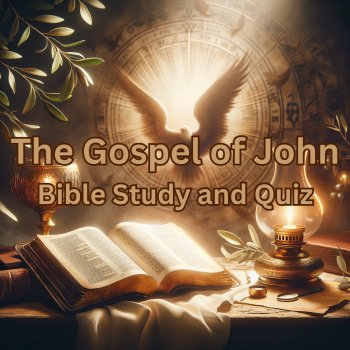
This blog post has an accompanying Bible quiz: John Chapter 1


